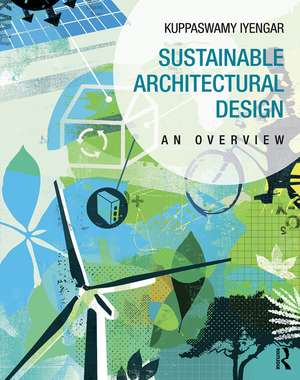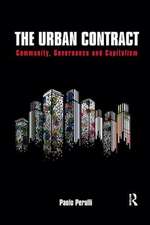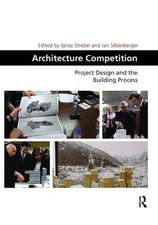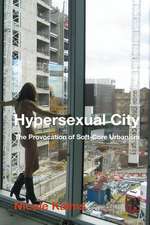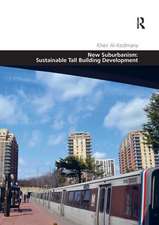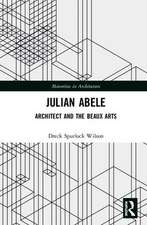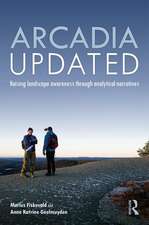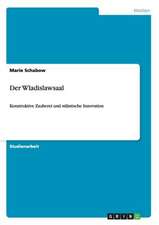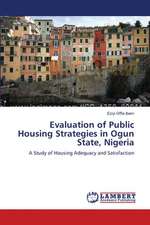Sustainable Architectural Design: An Overview
Autor Kuppaswamy Iyengaren Limba Engleză Paperback – 7 iul 2015
Includes an overview of alternate assessment and evaluation systems such as BREEAM, CASBEE, GBTool, Green Globes alongside LEED, ECOTECT, energy 10, HEED and eQuest simulation programs. The guide reveals the importance of the building envelope—walls, superstructure, insulation, windows, floors, roofs, and building materials—on the environmental impact of a building, and has a section on site systems examining site selection, landscape design, thermal impact, and building placement.
| Toate formatele și edițiile | Preț | Express |
|---|---|---|
| Paperback (1) | 468.30 lei 6-8 săpt. | |
| Taylor & Francis – 7 iul 2015 | 468.30 lei 6-8 săpt. | |
| Hardback (1) | 1029.43 lei 6-8 săpt. | |
| Taylor & Francis – 9 iul 2015 | 1029.43 lei 6-8 săpt. |
Preț: 468.30 lei
Preț vechi: 596.87 lei
-22% Nou
Puncte Express: 702
Preț estimativ în valută:
89.61€ • 93.99$ • 74.60£
89.61€ • 93.99$ • 74.60£
Carte tipărită la comandă
Livrare economică 01-15 aprilie
Preluare comenzi: 021 569.72.76
Specificații
ISBN-13: 9780415702355
ISBN-10: 0415702356
Pagini: 294
Ilustrații: 112 Line drawings, color; 120 Halftones, color; 23 Tables, black and white
Dimensiuni: 219 x 276 x 19 mm
Greutate: 1.08 kg
Ediția:1
Editura: Taylor & Francis
Colecția Routledge
Locul publicării:Oxford, United Kingdom
ISBN-10: 0415702356
Pagini: 294
Ilustrații: 112 Line drawings, color; 120 Halftones, color; 23 Tables, black and white
Dimensiuni: 219 x 276 x 19 mm
Greutate: 1.08 kg
Ediția:1
Editura: Taylor & Francis
Colecția Routledge
Locul publicării:Oxford, United Kingdom
Public țintă
UndergraduateCuprins
Acknowledgements. Introduction. 1. Rationale For Sustainable Buildings 1.1. Rationale for Sustainable Buildings 1.2. Lessons From Nature 1.3. Principles And Philosophy 1.4. Critical Perspectives 2. Passive Sustainable Design Ideas/Tools 2.1. Principle Sustainable Building Design Ideas 2.2. Passive Heating – Energy From Sun 2.3. Passive Cooling - Sun Control, Orientation and Ventilation 2.4. Passive Cooling – Air and Water Systems 2.5. Ground Source and Other Heating & Cooling 2.6. Sustainable Technologies: Works in Progress 3. Site Issues 3.1. Selection and Analysis 3.2. Landscape Design 3.3. Thermal Impact of Urban Infrastructure 3.4. Placement of Buildings 3.5. Building Clusters 4. Building Envelope 4.1. Thermal Loads 4.2. Role of Insulation 4.3. Sustainable Materials/Construction 4.4. Walls and Superstructure 4.5. Windows 4.6. Floors and Roofs 5. Active Environmental Systems 5.1. Lighting Design 5.2. HVAC Design 5.3. Indoor Air Quality 5.4. Water and Waste Management 6. Evaluation Tools & Examples 6.1. Evaluation of Sustainable Buildings 6.2. Energy Sources and Sustainability Audits 6.3 Case Studies. Conclusion. List of Figures. List of Tables. List of Charts. Index
Notă biografică
Kuppaswamy Iyengar is an Associate Professor, Associate Director, and Regents Lecturer in the architecture program at the University of New Mexico. Professor Iyengar is a highly skilled teacher and technical consultant, combining his degrees in civil and structural engineering and architecture with over fifty years' practical experience. In addition to developing academic courses of study, he has designed and presented over 50 seminars in professional settings, bringing his expertise to students in academic, governmental, and commercial locations in India, Barbados, the USA, England, Canada, Australia, the Philippines, and Thailand.
Recenzii
'Kuppaswamy Iyengar’s book is a tour de force. Finally, we now have a comprehensive, applications-oriented textbook on sustainable design that should be required reading for all architecture students. In a single volume, Iyengar deftly blends the technical, practical, and poetic; crystallizes relevant knowledge and research; and provides a strong theoretical underpinning to inform the design process. Sustainable Architectural Design will be indispensable for a new generation of architects to create excellent architecture worldwide, and to help our planet triumph over global warming.' - Andrew Pressman, FAIA, Architect and Lecturer, University of Maryland, USA
'Professor Iyegnar skillfully blends the theoretical vision of designing sustainable architecture with the practical realities of actually achieving it. The book is built around updating the design process to include the full array of available strategies, from ancient principles of harvesting natural site energy sources to the latest in green materials, efficiency technologies, and alternative assessment systems. Written for the classroom, this book will be a much-used resource for the practicing architect as well.' - Edward Mazria, Founder and CEO, Architecture 2030, USA
‘This book is the most up-to-date and complete volume on sustainable design available. In this lavishly designed book, with over 200 photos, graphs, and illustrations, Iyengar takes the reader from first principles, through both passive and active design schemes, to evaluation and planning of site and building envelope design. Clearly and succinctly written and accompanied by an extensive bibliography, this book is highly recommended.’ - Craig B. Smith, PhD. President, DMJM H&N (Ret.), USA
'Timely, important, and well written, this book is a pleasure to read. It is a valuable resource for anyone in the field of architectural design or the energy industry and will be a great teaching tool for new students entering these professions. Best of all, anyone even remotely interested in sustainability will find this a very readable and informative book.' - Kelly E. Parmenter, Ph.D., CEM, Applied Energy Group, Inc., USA
'Iyengar has skilfully and elegantly synthesized the essential information needed to design sustainable buildings, presenting a comprehensive overview in a logical and succinct, yet thorough, format that both students and instructors will highly value and appreciate. The organization of the book is perfect for a semester course, but will also be a highly useful stepping off point for further exploration with its wealth of case studies, references and resources. This text is a particularly useful and valuable addition to the literature on the design of sustainable buildings.' - Stephen D. Dent, AIA, Professor, University of New Mexico and Partner, Dent & Nordhaus Architects, USA
'This book is an effective overview and would make an excellent textbook for managers, students and architects interested in architectural sustainable design. There is a focus on energy in terms of design for buildings, and it also contains site selection analysis in detail. The author has done an admirable job showing theory in terms of practice - something others have not succeeded as well at.' - Jeff Thurston, 3D Visualization World Magazine
'Professor Iyegnar skillfully blends the theoretical vision of designing sustainable architecture with the practical realities of actually achieving it. The book is built around updating the design process to include the full array of available strategies, from ancient principles of harvesting natural site energy sources to the latest in green materials, efficiency technologies, and alternative assessment systems. Written for the classroom, this book will be a much-used resource for the practicing architect as well.' - Edward Mazria, Founder and CEO, Architecture 2030, USA
‘This book is the most up-to-date and complete volume on sustainable design available. In this lavishly designed book, with over 200 photos, graphs, and illustrations, Iyengar takes the reader from first principles, through both passive and active design schemes, to evaluation and planning of site and building envelope design. Clearly and succinctly written and accompanied by an extensive bibliography, this book is highly recommended.’ - Craig B. Smith, PhD. President, DMJM H&N (Ret.), USA
'Timely, important, and well written, this book is a pleasure to read. It is a valuable resource for anyone in the field of architectural design or the energy industry and will be a great teaching tool for new students entering these professions. Best of all, anyone even remotely interested in sustainability will find this a very readable and informative book.' - Kelly E. Parmenter, Ph.D., CEM, Applied Energy Group, Inc., USA
'Iyengar has skilfully and elegantly synthesized the essential information needed to design sustainable buildings, presenting a comprehensive overview in a logical and succinct, yet thorough, format that both students and instructors will highly value and appreciate. The organization of the book is perfect for a semester course, but will also be a highly useful stepping off point for further exploration with its wealth of case studies, references and resources. This text is a particularly useful and valuable addition to the literature on the design of sustainable buildings.' - Stephen D. Dent, AIA, Professor, University of New Mexico and Partner, Dent & Nordhaus Architects, USA
'This book is an effective overview and would make an excellent textbook for managers, students and architects interested in architectural sustainable design. There is a focus on energy in terms of design for buildings, and it also contains site selection analysis in detail. The author has done an admirable job showing theory in terms of practice - something others have not succeeded as well at.' - Jeff Thurston, 3D Visualization World Magazine
Descriere
This book is a guide to a sustainable design process that moves from theory, to site and energy use, to building systems, and finally to evaluation and case studies, so you can integrate design and technology for effective sustainable building.
